Fiona Ingram's Blog, page 49
June 12, 2013
Piggy on Wheels Teaches Kids Compassion
When I read the headlines on Galleycat that a piggy in a wheelchair had inked a 3-book deal with self-help publisher Hay House, I was instantly intrigued. Wouldn’t you be too? His press release says: Chris P. Bacon, the pig in a wheelchair who quickly became a YouTube sensation in early 2013 with over 1.2 million views, is setting out to teach children about compassion, acceptance, and loving your imperfections. Chris P. Bacon was rescued by his veterinarian Dr. Len Lucero after a young woman reluctantly dropped him off to be euthanized because of a congenital defect that affects his rear legs. Dr. Lucero gave Chris a second chance at life and with two wheels strapped to the rear of his body, he is now a perfectly healthy and happy piggy-on-the-go.
 Chris P. with training wheelsThis little piggy was born with deformed hind legs, which means he lifts himself up on his front legs. While he is little, this modus operandi will work, but not later when he grows to full weight. His new owner modified his son’s toys to give Chris P. his first set of wheels. As the piggy grows heavier, he’ll graduate to bigger and better wheels. For many animals, life would be over, but for Chris P., life and a new role has just begun. His YouTube videos and his television appearances show him to be a curious, affectionate, independent and very intelligent piglet, with loads of personality and a secret obsession with grapes.
Chris P. with training wheelsThis little piggy was born with deformed hind legs, which means he lifts himself up on his front legs. While he is little, this modus operandi will work, but not later when he grows to full weight. His new owner modified his son’s toys to give Chris P. his first set of wheels. As the piggy grows heavier, he’ll graduate to bigger and better wheels. For many animals, life would be over, but for Chris P., life and a new role has just begun. His YouTube videos and his television appearances show him to be a curious, affectionate, independent and very intelligent piglet, with loads of personality and a secret obsession with grapes.Chris P. says on his Facebook page: My name is Chris P. Bacon. I am a pig in a wheelchair. My veterinarian Dr. Len Lucero decided that I needed to be given a second chance. I went home with Dr. Lucero that day, so that I would have a chance at life as a handicapped pig. I live in Florida and love my new life! Watch me grow and take on new obstacles that life has to offer me. Thanks for sharing it with me!
 Chris P. with owner Len LuceroOwner Len Lucero finds that the pig is garnering fans by the barrow loads, and with his own website, Facebook page, Pinterest and Twitter account, it’s not hard for Chris P. to spread the message: it’s okay to be disabled. Chris P. and Len have a new task in life: putting smiles back onto disabled/handicapped kids’ faces. Chris P. and Len Lucero will be travelling to various centres to help kids. Chris P. will spread the message of love just by being himself!
Chris P. with owner Len LuceroOwner Len Lucero finds that the pig is garnering fans by the barrow loads, and with his own website, Facebook page, Pinterest and Twitter account, it’s not hard for Chris P. to spread the message: it’s okay to be disabled. Chris P. and Len have a new task in life: putting smiles back onto disabled/handicapped kids’ faces. Chris P. and Len Lucero will be travelling to various centres to help kids. Chris P. will spread the message of love just by being himself! Teaching kids compassion is a wonderful start in life. From this beginning, kids learn the best qualities that make them better human beings. Kids will learn about perseverance, overcoming obstacles, and tolerance towards others.
 "Vroooooom!"Hay House, the world’s largest self-help and motivational publisher has signed a three-book deal with Chris P. Bacon, his dad Dr. Lucero and co-author Kristina Tracy, who has worked on children’s books with Wayne W. Dyer, Dr. Christiane Northrup, Deepak Chopra and more. The first book, geared towards children ages 4-10, will launch in Fall 2013.
"Vroooooom!"Hay House, the world’s largest self-help and motivational publisher has signed a three-book deal with Chris P. Bacon, his dad Dr. Lucero and co-author Kristina Tracy, who has worked on children’s books with Wayne W. Dyer, Dr. Christiane Northrup, Deepak Chopra and more. The first book, geared towards children ages 4-10, will launch in Fall 2013.Help Chris P. spread the word by visiting his social media sites and following his trail of good deeds. Please share his antics and share the message.
by Fiona Ingram
June 9, 2013
How to Sell eBooks Directly to Readers
 While people might stumble upon your book on Amazon, iBookstore, Nook, Google Play, and Kobo because of internal recommendation engines and large amounts of traffic, this isn't going to happen with this type of sale.
Gumroad
While people might stumble upon your book on Amazon, iBookstore, Nook, Google Play, and Kobo because of internal recommendation engines and large amounts of traffic, this isn't going to happen with this type of sale.
Gumroad
Gumroad charges $0.25 per download plus 5 percent of the sale for hosting and selling your file. For example, if you sell a PDF for $3, Gumroad keeps $0.40 ($0.25 + 5 percent of $3) and you'd get $2.60. This is more than you'd get from Kindle Direct Publishing for the same transaction. Gumroad also offers a "$0+" option. This means that people can pay whatever they want to-including nothing.
I used Gumroad to distribute a PDF of What the Plus! Unfortunately, I didn't track results when I varied the price from $2.99 to as low as "pay what you want." Over the course of a month, 26,717 people clicked on the link, and 1,632 people downloaded it.
Most people paid $0, but the donations amounted to $803.23, so the average amount paid was approximately $0.50 per copy. This was four months after the introduction of the book. By that time, I had given away approximately 15,000 copies and sold 15,000 copies.
People cannot pay with PayPal because Gumroad only accepts credit cards. Also, Gumroad asks for a minimal amount of personal information, so it cannot provide information about where your customers live. Someday you may need this information to charge sales tax or value-added tax for digital content.
Gumroad requires a preexisting and loyal audience that will click on a link that you provide. As a first-time author, this may be difficult, but you'll learn how to build your "platform" in the next section of the book, "Entrepreneur." If you can make this work, there are two big benefits: retention of more of the selling price and access to the e-mail addresses of everyone who has bought the file. E-Junkie
E-Junkie is another way to sell your book directly. Unlike Gumroad's per-copy flat fee and percentage, E-Junkie charges according to the number of files and storage space that you use. The number of downloads is unlimited.
A collection of ten files totaling less than fifty megabytes costs $5 per month. Therefore, if you had one book that is less than fifty megabytes (which is a huge size for a book), you'd only pay $5 per month, and you could sell an unlimited number of copies.
Unlike Gumroad, customers can use PayPal, Google Checkout, TrialPay, and Authorize.net but not credit cards. Finally, also unlike Gumroad, E-Junkie can calculate sales tax and VAT charges because it knows where your customers reside. ClickBank
ClickBank is a third way to sell ebooks directly. You create an account, upload your file, price it, and sell it. There is a $49.95 activation fee to get started. Customers can use credit cards or PayPal.
A key difference between ClickBank and the other two services is ClickBank's affiliate program. The scenario ClickBank paints is that people discover great books in the ClickBank marketplace. Then they join the ClickBank affiliate program, get an affiliate link to their favorite books, and promote the link on their blog and through social media.
The company says that it has 100,000 affiliates in 200 countries. It claims to have paid more than $1.8 billion to affiliates and vendors (the people who upload files) and to process 30,000 transactions per day.
The revenue split with ClickBank is different from the other direct-sales sites. ClickBank operates on a wholesale price/retail price model, which means you set a wholesale price (the price at which ClickBank and other affiliates buy the book from you) and a retail price (the price customers see and pay). Your revenue is the wholesale price, since you are selling to ClickBank, and they are the seller of record to customers. Ganxy
Ganxy is an interesting start-up in this segment. It enables you create a "showcase" for your eBook and sell it in EPUB, MOBI, and PDF format. Ganxy provides payment functionality, file hosting, and customer service.
Ganxy charges 10 percent of net sales, where net sales is the selling price of the eBook less a payment-processing fee. Think of it as a website like Gumroad, E-Junkie, and ClickBank that is dedicated to selling eBooks. Caveats
If you can convince people to buy your book from these services, you can make more money per book. Nathan Barry's App Design Handbook is an example. Barry has a concentrated market of app programmers, and these programmers are willing to pay his book's price of $39.
For these programmers, the book isn't a $2.99 Gothic-romance whim. Designing apps is their livelihood, so a $39 price point for a book that can help them succeed isn't a problem. Barry makes approximately $38.20 per book, so if he sold 2,000 copies, he could buy a Porsche.
On the other hand, online eBook resellers such as Amazon and Apple pay less per copy, but they may sell more copies. Also, direct sales do not count toward sales rankings for bestseller lists, and books on these lists tend to sell more because they are visible.
If your customers are not price sensitive and you have a way to reach them, then selling direct can work. If these conditions do not exist, then it may be better to make less money per copy but sell more copies using online resellers and bookstores. PayPal
If you're wondering about using PayPal to sell eBooks, it's not applicable to most self-publishers because this would require creating a website where your readers have an account, and you control access to your eBook's file. Essentially, you'd have to become your own E-Junkie and manage an ecommerce site.
PayPal provides payment collection, and when someone pays, it tells your website to grant access-for example, if someone buys more weapons in an online game. Credit cards such as MasterCard and Visa work in similar ways. However, these companies do not act as your store by hosting your eBook and selling it.
So your customers can pay with PayPal and credit cards, but on Gumroad, E-Junkie, and ClickBank, not directly to you.
This fantastic information comes from Guy Kawasaki, who has written 12 books, 10 of which were
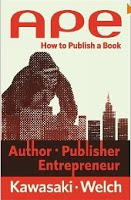 traditionally published. His newest book is APE: Author, Publisher, Entrepreneur - How to Publish a Book, which helps people understand how and why to self-publish.
traditionally published. His newest book is APE: Author, Publisher, Entrepreneur - How to Publish a Book, which helps people understand how and why to self-publish.APE: Author, Publisher, Entrepreneur - How to Publish a Book, by Guy Kawasaki and Shawn Welch, is available as an eBook ($9.99) and in paperback ($24.99). Visit
Reprinted from "The Book Marketing Expert newsletter," a free ezine offering book promotion and publicity tips and techniques.
by Fiona Ingram
June 8, 2013
Q&A with author Tanya J. Peterson
Mental disorders are common in the United States and internationally. An estimated 26.2 percent of Americans ages 18 and older or about one in four adults suffer from a diagnosable mental disorder in a given year. When applied to the 2004 U.S. Census residential population estimate for ages 18 and older, this figure translates to 57.7 million people. Even though mental disorders are widespread in the population, the main burden of illness is concentrated in a much smaller proportion about 6 percent, or 1 in 17 who suffer from a serious mental illness. In addition, mental disorders are the
 Author Tanya J. Petersonleading cause of disability in the U.S. and Canada for ages 15-44. Many people suffer from more than one mental disorder at a given time. Nearly half (45 percent) of those with any mental disorder meet criteria for two or more disorders. In my research, I also noticed a large variety of other disorders, ranging from schizophrenia, to PTSD, to panic attacks.
Author Tanya J. Petersonleading cause of disability in the U.S. and Canada for ages 15-44. Many people suffer from more than one mental disorder at a given time. Nearly half (45 percent) of those with any mental disorder meet criteria for two or more disorders. In my research, I also noticed a large variety of other disorders, ranging from schizophrenia, to PTSD, to panic attacks.You are a counselor with an education and background in this kind of work. You deal with facts – so what made you turn to fiction to create a story about mental disorders?I strongly believe that fiction can be a power vehicle for conveying human truths. There is a plethora of excellent non-fiction books written about the different mental illnesses, and that’s very necessary. Non-fiction does a great job of teaching very important factual information. For my purposes, though, it has two drawbacks that I wanted to avoid: non-fiction books target a very specific audience, and they tend to focus on the conditions/disorders rather than on the human beings behind them. In using fiction, I hope to attract a broader range of readers in order to spread the message further. Also, with fiction, there are characters, people with whom readers can connect. So, in the case of Leave of Absence, not only will readers see what schizophrenia, PTSD, depression, and loss really are, but they will see what it’s like for the people who experience these mental illnesses. I suppose I should confess there is one other reason I opted for fiction. Fiction is incredibly fun to write! Even though this is a very serious subject, it was an enjoyable process.
In my view, the ‘collateral damage’ is often forgotten i.e. the effects on family and friends who find it easier to walk away because they can’t cope with a loved one’s disability. How do you feel a fiction story can help them?
Sometimes, friends and family walk away not because they don’t care but because they are overwhelmed or don’t fully understand the implications of their loved one’s illness. Reading the facts about a mental illness (or a physical one, for that matter) is essential and gives people a fundamental understanding of that illness. Being able to recite the symptoms of or the helpful medications for a disorder unfortunately doesn’t help prepare someone for the day-to-day interactions with a loved one experiencing a mental illness. In Leave of Absence, Penelope has schizophrenia. Her fiancé, William, knows that this involves such things as hallucinations and delusions. However, knowing this doesn’t automatically make things easy for him. He has watched their lives change. While they used to have an active social life, they have become isolated for various reasons associated with Penelope’s illness. Penelope’s demeanour has changed, and she is different toward William than she used to be. William struggles with this, yet he still loves her deeply because he sees the Penelope behind the illness.
Your observation of “collateral damage” suffered by friends and family of someone experiencing mental illness is very astute. The lifestyle and relationship changes to which William has to adjust are very common. In reading about the experiences of fictional characters (as long as the experiences are realistic and accurate), people can experience a sense of connection. Their hardships can be normalized, giving a feeling that they’re not alone. In seeing that the difficulties are common, they can feel a sense of relief that what they are feeling and experiencing is normal rather than a sign that they’re doing something wrong.
One more thought about fiction’s power. Even if a reader doesn’t experience exactly what the characters of a story do (because mental illness is very individualized; schizophrenia, for example, doesn’t look the same for everybody who experiences it), he/she can use a novel as a tool for discussion. A story and its characters can be vehicles for expression and a way to open up communication. (A caregiver can say, “Penelope hears Eleanor Roosevelt, and she’s really mean to her. What are hallucinations like for you?”)
How did you come up with the two different characters in Oliver and Penelope?
That’s the fun part of fiction! Oliver and Penelope are completely figments of my imagination, and developing them was a delight. Before I began writing, I knew the theme I wanted to convey (that there are real human beings behind a mental illness, and they’re not fearful people) as well as the mission (to counteract negative stereotypes and reduce the stigma associated with mental illness by increasing understanding of it as well as empathy for those who experience it). I also knew that in this novel I wanted to portray schizophrenia and post-traumatic stress disorder as these are illnesses we hear a great deal about but have little true understanding for. There are many negative, and incorrect, stereotypes associated with each of these. With that in mind, I knew that I had to start not with a storyline but with people/characters.
I have a personal quirk: I love stories that have male characters with whom I can bond. Therefore, I wanted Leave of Absence to have such a character, and Oliver was “born.” I imagined him thoroughly, and it felt right that he be the one with PTSD (well, maybe not “right,” because that’s kind of mean, but you get my drift). His story developed further in my mind, and of course I knew that the poor guy would also be suffering from depression and complicated mourning (complicated mourning isn’t a classifiable mental illness, but it is something that causes pain and difficulty). I then turned to schizophrenia and imagined who would experience it. After some visualization and brainstorming, Penelope was “born,” too. I spent time with her as well. I wanted to know these two well before I started to write their story. By the time I was ready to write, I knew them so well that the story almost wrote itself!
I believe you have been on ‘both sides’ of the couch, and have experienced some of the anguish of stress. Can you tell us how this helped you in creating your characters?
I have indeed been on both sides. I have an advanced degree in counselling, and I’m a Nationally Certified Counselor (in the US). I’ve worked and volunteered my services as a counsellor. This background has helped me understand the facts about mental illness with accuracy (although I didn’t rely only on this but rather conducted research before and during the writing process as well). It has also helped me see the people behind the illness and understand their very human emotions.The professional background was very helpful, but so was my personal experience. I actually have been a patient in a behavioural health centre much like Airhaven in Leave of Absence. It was there that I was diagnosed with bipolar I disorder and various anxiety difficulties. The hospitalization came in the aftermath of a motor vehicle accident in which I sustained a closed head injury (and having two separate concussions in the months that followed this accident didn’t help matters). There were other stressful events happening at the same time. None of this caused bipolar I disorder, of course, but they all made it difficult to continue to deny and ignore. Dealing with this has given me a deeper perspective than I would have otherwise. Oliver and Penelope, and their experiences, are entirely fictitious, but my own life experiences (both professionally and personally) have (hopefully) helped me give them depth and dimension.
What has been the response of readers to Leave of Absence?I’ve been absolutely thrilled by people’s reaction to Leave of Absence. I’ve had readers report that they have a deeper understanding of mental illness, that they see people with mental illness in a new light. I also read a review by someone who said that he used to be a psychology teacher and that he wishes he would have had Leave of Absence to use in his classroom for illustration and discussion of mental illness. Reactions like these are exactly what I am hoping for with Leave of Absence!
Additionally, I recently learned that Leave of Absence was selected as a finalist in the “faction” (fiction based on fact) category of the (US) National IndieExcellence Awards contest. For me the best part about this is the category, because this really is fiction based on fact, and I hope that this will lend credibility to my work.I’m also really pleased that many people seem to really connect with Oliver and Penelope. I love it when people tell me that when the book ended they weren’t ready to be done with the characters (William, too). I’m so happy about this for the sake of Oliver, Penelope, and William.
Where do you hope to take this new venture – are there more books in sight?I feel so strongly about increasing understanding and reducing stigma, so I hope this new venture gains momentum and keeps going. I’ve been giving presentations and talks about mental illness, and using Leave of Absence as a tool. I’ve even been invited to speak about mental illness at the national conference (US) of the Mothers of Incarcerated Sons Society,Inc. I’m extremely excited (and nervous) about that. So I hope to be able to continue to speak about mental illness.I do love writing, too, and I’ll always believe that fiction is a great tool for creating understanding and empathy. I hope to be able to continue writing novels. As a matter of fact, I am working on a new one right now. I’m still in the very early stages, and I’m developing the characters at the moment. It’s a bit difficult because I still feel connected to Oliver, Penelope, and William, but as I brainstorm and imagine, I’m already bonding with the new group. This one will of course be very different from Leave of Absence, but it will address the same overall theme. It will be fun!
Is there anything you’d like readers of my blog and the book to remember/take away with them?First and foremost, I want you and your readers to know how deeply I appreciate all of you. Fiona, thank you for hosting me on your blog, and readers, thank you for reading Fiona’s review of Leave of Absence as well as our interview. I believe strongly in my mission (for the sake of others rather than myself), and I really hope to be able to spread my message. It’s not easy to start up, though. For a variety of reasons (the primary one is that I wanted to retain control over what I could and could not do with
 Leave of AbsenceLeave of Absence [I’ve been told I’m stubborn]), I decided against the traditional publishing route despite potential opportunities. Whether I published traditionally, independently, or a hybrid of the two (which I did), I’m starting out unknown and I need to work to make readers aware of Leave of Absence. I couldn’t do that without you, and I am truly grateful for your time and attention. Thank you. Fiona, your blog is incredibly well-done, and it’s an honour to be part of it.You’ve asked terrific questions that have helped me convey my message, so I don’t want to be too repetitive. To close, I will simply say this: seek always to understand, for behind someone’s difficulties is a human being.
Leave of AbsenceLeave of Absence [I’ve been told I’m stubborn]), I decided against the traditional publishing route despite potential opportunities. Whether I published traditionally, independently, or a hybrid of the two (which I did), I’m starting out unknown and I need to work to make readers aware of Leave of Absence. I couldn’t do that without you, and I am truly grateful for your time and attention. Thank you. Fiona, your blog is incredibly well-done, and it’s an honour to be part of it.You’ve asked terrific questions that have helped me convey my message, so I don’t want to be too repetitive. To close, I will simply say this: seek always to understand, for behind someone’s difficulties is a human being.Here's wishing you a wonderful journey and great success with your fantastic book Tanya. Thank you for sharing your wisdom and insight with us today.
by Fiona Ingram
June 7, 2013
Book Review: The Great White Elk
It’s hard to make history come alive, but in the capable hands of author Frederick Wulff, the historical character of Alexander McKee, a British Indian agent of the colonial frontier, springs vibrantly from the dusty pages of history books. The author uncovers the tragic realities and the bloody consequences of colonialism and the sad disintegration of the Indian way of life as the white man’s behaviour and lawlessness eroded their culture and their rights. The devastating effects of the rum trade cannot be underestimated. The author also reveals the incredible personal story behind the man who played a seminal role in this compelling and chaotic piece of American history. Born of a Shawnee mother and a British father, choosing sides could not have been easy for McKee in the culture clash between the land-grabbing colonialists, the traders, and the Indians, the original
 inhabitants of this new territory. McKee was a man who could straddle two cultures, understanding both, but ultimately choosing to speak up for the displaced Indians, and losing much in the bargain. McKee is revealed as an exceptional man, intelligent and educated, perceptive, and possessing great leadership qualities. From his mother he learned the values and traditions of her people. He helped broker a precarious peace between Indians, traders, and settlers. McKee earned the title “The Great White Elk,” and this term of respect and admiration was well-deserved as he maneuvered British frontier policy and promoted the interests of the beleaguered Native Americans in the post-Revolution era. His principles and actions did not appeal to later historians who branded him a traitor.
inhabitants of this new territory. McKee was a man who could straddle two cultures, understanding both, but ultimately choosing to speak up for the displaced Indians, and losing much in the bargain. McKee is revealed as an exceptional man, intelligent and educated, perceptive, and possessing great leadership qualities. From his mother he learned the values and traditions of her people. He helped broker a precarious peace between Indians, traders, and settlers. McKee earned the title “The Great White Elk,” and this term of respect and admiration was well-deserved as he maneuvered British frontier policy and promoted the interests of the beleaguered Native Americans in the post-Revolution era. His principles and actions did not appeal to later historians who branded him a traitor. Frederick Wulff’s account of this remarkable man will keep history buffs captivated. Minutely researched and written with a deep understanding of the era and Alexander McKee, this book is an excellent read. The author has an easy-to-read style that makes the wealth of information easily assimilated. Five Stars. Highly recommended.
by Fiona Ingram
June 4, 2013
17th Kid Lit Blog Hop
 <div align="center"><a href="http://motherdaughterbookreviews.com/..." title="Kid Lit Blog Hop"><img src="http://motherdaughterbookreviews.com/..." alt="Kid Lit Blog Hop" style="border:none;" /></a></div>
Kid Lit Blog Hop Rules *NEW*:
1. *NEW*
We ask that you kindly follow your hostesses and co-hostesses.
You can follow us any way you choose (Email, GFC, Twitter, Facebook, G+, Pinterest, etc.), but we've added our preferences below. If you could just give us a quick "follow" or "like" that would be much appreciated! Make sure to leave us a message if you are following us (i.e., on Twitter or Facebook or on our websites) and we will be sure to follow you back. Thanks! :-)
<div align="center"><a href="http://motherdaughterbookreviews.com/..." title="Kid Lit Blog Hop"><img src="http://motherdaughterbookreviews.com/..." alt="Kid Lit Blog Hop" style="border:none;" /></a></div>
Kid Lit Blog Hop Rules *NEW*:
1. *NEW*
We ask that you kindly follow your hostesses and co-hostesses.
You can follow us any way you choose (Email, GFC, Twitter, Facebook, G+, Pinterest, etc.), but we've added our preferences below. If you could just give us a quick "follow" or "like" that would be much appreciated! Make sure to leave us a message if you are following us (i.e., on Twitter or Facebook or on our websites) and we will be sure to follow you back. Thanks! :-) Hostesses:
Renee @ Mother Daughter Book Reviews Twitter * Goodreads
Jaymie @ Snacks for Max Twitter * Facebook
Heidi @ Geo Librarian Twitter * Facebook
Sue @ Kid Lit Reviews Twitter * Facebook
Katie @ Youth Literature Reviews Twitter * Facebook
Julie Grasso, Author of Escape From the Forbidden Planet/Blogger Twitter * Facebook
Cheryl Carpinello, Author of Guinevere & The King's Ransom / Blogger Twitter * Facebook
Reshama @ Stacking Books Twitter * Facebook
Co-Hostesses:
Fiona Ingram, Author of The Secret of the Sacred Scarab / Blogger Twitter * Pinterest
2. Link up any Kid Lit related post. This can be a link to a children�s book review, a discussion about children�s literature/literacy, or a post on a recently-read children�s book or one that you love from your childhood.* Don't link directly to your blog, it must be a specific post*
* For Authors, we prefer you to link to your blog if you have one *
* Make sure you include an image relevant to the POST (e.g., book cover), not your blog button or photo of yourself.*
* Feel free to link more than one post.*
3. *NEW* Please visit AT LEAST the TWO LINKS directly ahead of your own and leave them some love in the form of a comment. We are trying to build a community of bloggers, readers, parents, authors, and others who are as passionate about children�s literature as we are so please CONNECT and follow any or all of the blogs that interest you! 4. If you like, grab the button above and put it somewhere on your blog, preferably the post you're linking up. If you'd prefer, you can just add a text link back to this Hop so that others can find it and check out all these great book links! 5. It would really help us get the word out about the Kid Lit Blog Hop if you would be so kind as to tweet, share, and spread the word about the Hop!Interested in co-hosting the Kid Lit Blog Hop? Please email renee @ motherdaughterbookreviews (dot) com and put Co-Hosting Blog Hop in the subject line.Happy Hopping!
May 26, 2013
Book Review: Millicent Marie Is Not My Name
Not content with saddling their daughter with a mouthful of a name like Millicent Marie (after a grumpy family member), Millicent Marie’s parents insist on calling her by that very same huge mouthful. Known to her school friends as Millie, Millicent Marie is grateful that she did not end up with a cool, arty, celebrity kid name like Organza. However, Millie decides that if she’d had a choice, her name would have been Amanda. Amanda has such a nice ring to it. After all, Amandas are beautiful, wildly popular, and talented. When Millie begins a diary in which she signs her name as Amanda, little does she realize what a ten-year-old annoying little brother (Douglas aka Doogle) can do to wreak even more havoc in her life. Doogle finds Millie’s diary on her computer and publishes it as a blog for the entire world to see. Amanda’s soul is suddenly laid bare and, amazingly, people love her. She becomes Springside Elementary’s most sought after sixth-grade mystery gossip and advice columnist. Can Millie keep up the pretence? And for how long before her cover is blown?
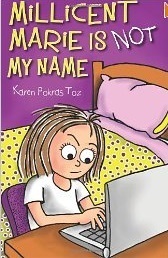 This is a lovely read for tweens (and their parents!). Millie has the usual slightly disparaging attitude towards her prehistoric-age, totally embarrassing parents who (in the nature of all parents) seem to be incapable of treating her as the almost-adult she considers herself. Millie was given the choice of a computer or a cell phone when she turned twelve. Everyone knows that any self-respecting tween needs both. Author Karen Pokras Toz captures Millie’s life angst—from disillusionment with sixth grade, to decisions about doing soccer or drama, to denying she has a crush on the utterly handsome Jordan Cowell—with humor and inside knowledge. I also enjoyed Millie’s coming of age and gradual maturing. As Amanda, Millie learns huge life lessons about friendship, respect, and the fact that other people have feelings and problems. As Millie, Millie learns about her identity, who she really is, and decides if she is happy being herself. Highly recommended. Available on
This is a lovely read for tweens (and their parents!). Millie has the usual slightly disparaging attitude towards her prehistoric-age, totally embarrassing parents who (in the nature of all parents) seem to be incapable of treating her as the almost-adult she considers herself. Millie was given the choice of a computer or a cell phone when she turned twelve. Everyone knows that any self-respecting tween needs both. Author Karen Pokras Toz captures Millie’s life angst—from disillusionment with sixth grade, to decisions about doing soccer or drama, to denying she has a crush on the utterly handsome Jordan Cowell—with humor and inside knowledge. I also enjoyed Millie’s coming of age and gradual maturing. As Amanda, Millie learns huge life lessons about friendship, respect, and the fact that other people have feelings and problems. As Millie, Millie learns about her identity, who she really is, and decides if she is happy being herself. Highly recommended. Available on
May 25, 2013
Book Review: Leave of Absence
Can fiction depict the raw truth of mental illness and instability? In Leave of Absence , author Tanya J. Peterson creates a searing story that offers insight and understanding into a world that most of us will never comprehend or experience. When Oliver Graham’s wife and child are tragically killed, he walks away from his life and off the edge of a building. Saved against his will by a brave and quick-thinking police office, Oliver enters Airhaven Behavioural Health Center. However, he doesn’t want to be there: he wants to be dead. He finds a shred of a connection with inmate Penelope who is struggling with schizophrenia. But Penelope has someone who wants her to live. Her fiancé, William, loves her and still wants to marry her. Penelope struggles to cling to the last remnants of sanity as the voices in her head, led by the dominating personality of Eleanor Roosevelt, threaten to take over. Oliver is consumed by guilt that he was not there to save his family; Penelope is consumed by guilt that she is wrecking the life of the man she loves. This odd couple (Oliver and Penelope) lean on each other, comfort each other, and try to give each other a reason to live.This book is no easy read as it delves into the convoluted workings of the disturbed mind. Oliver’s mental breakdown comes from terrible grief and anguish, while Penelope’s is physiological and she requires medication to control her mind. Leaving the safe haven of the center is not easy and there is no happy ending with Penelope and Oliver riding off into the sunset with their respective loved ones. Instead, they struggle to cling to even the barest semblance of reality. The terror of panic attacks, the horrifying descent into perceived madness as the voices control the body is graphically described, suggesting the author’s personal experience in working with these conditions and intense research.
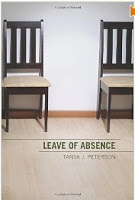
One cannot read this book and remain distanced; one must plunge right in and share the agony. Oliver’s pain and Penelope’s instability draw the reader into their world, and one finds oneself inhabiting the character’s skin. The reactions of Oliver’s family and William’s friends perfectly capture the kind of collateral damage that happens when someone near and dear is ‘less than normal.’
Author Tanya J. Peterson has both the experience and education to fully investigate the anguish of post-traumatic stress disorder, depression, and schizophrenia. Ms. Peterson also has a deft and sensitive touch as she humanizes her characters, making us want to understand them, making us want them to be saved by something or someone, and at last, we see they must save themselves. A story of grief, friendship, downfall, and redemption, the threads of hope shine ever bright as Oliver and Penelope put their own pain and fear aside to help each other. The book is not about plot, in fact, it’s about life and two people who have to rebuild their broken realities. This is an excellent book for both sufferers of mental disorders, and their circle of family members and friends to read to gain insight and awareness into both temporary and more lasting mental disorders. Highly recommended. 5 Stars About the Author: Tanya J. Peterson holds a Bachelor of Science in secondary education, Master of Science in counseling, and is a Nationally Certified Counselor. She has been a teacher and a counselor in various settings, including a traditional high school and an alternative school for homeless and runaway adolescents, and she has volunteered her services in both schools and communities. Her previous titles include Losing Elizabeth, a young adult novel about an abusive relationship. To learn more, visit the author's site. Ms Peterson will visit my blog next week in an author Q&A.
May 19, 2013
Book Review: A Boy and his Dragon
Bradley Wallace Murphy just turned thirteen, and life sucks. He doesn’t fit in at school, he’s no good at sports, a bully torments him, he’s a disappointment to his parents, and his only “friends” are fictional characters on a TV show called “Dark Shadows.” He’s growing up but wants to stay a boy, like Peter Pan. Then he finds the egg and everything changes. From this egg hatches Whilly, a supposedly mythological dragon that bonds with him physically, emotionally and spiritually. The sudden responsibility of hiding a rapidly growing dragon in a small California city in 1970 forces Bradley Wallace to grow up whether he wants to or not. Feeding a hungry dragon involves lots of raw meat, and the horrible reality of death sickens Bradley, turning him vegetarian, and upsetting his mother. Through their adventures together, boy and dragon learn the true nature of their symbiosis, and Bradley Wallace comes to understand that he is not just a misfit kid who happened to find a misfit creature from some other time. He is something far more dangerous, a ‘super-hero’ with powers he didn’t know he had. He could be killed if the truth comes out. When the attacks begin, Bradley Wallace realizes he is up against overwhelming evil forces. Can he and Whilly survive?
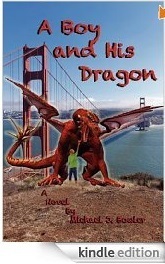 What an amazing, magical adventure. Everyone who has ever imagined having a dragon, flying with it, and befriending this wonderful mythological creature will jump right into this book. Author Michael J. Bowler has such a gift for recreating the experiences and muddled logic of a 13-year-old self-confessed misfit. He also brings the Seventies to life in wonderful detail, a time of Drive-ins, Eskimo Pie, Star Trek, and long summer holidays. I loved this story and the delicately flowering relationship between Whilly and Bradley Wallace is peppered with humour, misunderstanding, forgiveness, and a lot of acceptance (after Bradley discovers what happened to the neighbourhood cats…). The author cements the bonds that must survive the terrible tests facing the boy and the dragon. The story sucks the reader right into Bradley’s life, along with his slightly dysfunctional family, his bossy older sister, and the school bullies. Kids will love this adventure and adults will relish remembering being 13 again. The book is long but all the elements merge into a satisfying whole to perfectly capture the boy-dragon symbiosis. This book is intended as the first in a trilogy and I am sure young fans will eagerly await more from Bradley Wallace and Whilly. Available from Amazon. Highly Recommended. 4 stars(The book mentions definite adolescent physiological changes so I advise parents to stick to the age recommendation of YA 13+)First reviewed for Readers Favorite by Fiona Ingram
What an amazing, magical adventure. Everyone who has ever imagined having a dragon, flying with it, and befriending this wonderful mythological creature will jump right into this book. Author Michael J. Bowler has such a gift for recreating the experiences and muddled logic of a 13-year-old self-confessed misfit. He also brings the Seventies to life in wonderful detail, a time of Drive-ins, Eskimo Pie, Star Trek, and long summer holidays. I loved this story and the delicately flowering relationship between Whilly and Bradley Wallace is peppered with humour, misunderstanding, forgiveness, and a lot of acceptance (after Bradley discovers what happened to the neighbourhood cats…). The author cements the bonds that must survive the terrible tests facing the boy and the dragon. The story sucks the reader right into Bradley’s life, along with his slightly dysfunctional family, his bossy older sister, and the school bullies. Kids will love this adventure and adults will relish remembering being 13 again. The book is long but all the elements merge into a satisfying whole to perfectly capture the boy-dragon symbiosis. This book is intended as the first in a trilogy and I am sure young fans will eagerly await more from Bradley Wallace and Whilly. Available from Amazon. Highly Recommended. 4 stars(The book mentions definite adolescent physiological changes so I advise parents to stick to the age recommendation of YA 13+)First reviewed for Readers Favorite by Fiona IngramMay 17, 2013
Book Review: Seven Spectral Into the Red World
Emerald Drizzleweather Bogwater has an unfortunate name, unfortunate red hair, and an unfortunate tendency to rebel. When she escapes her small, dull, slow village (where everyone and everything is in shades of green) to see the world, she discovers something she wasn't bargaining for...a whole new one. Now she must solve the mystery of the Egyptian-styled Red World (and its problems), before its dangers ensnare her forever. Escaping was relatively easy. Emer’s father (Alder Bogwater) tries to make her stay by bringing her back forcibly. She has even been married off to the kind of boy any sane girl would avoid—an oaf who drinks far too much lime ale. But Emer is on a mission to find her mother, Lore, with nothing but memories and an old turquoise compass, one of the pair that works in unison.
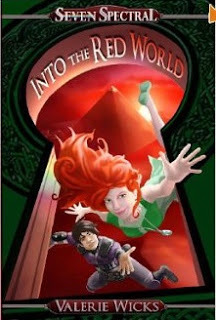
However, if that means charting a dangerous course, so be it. With her green otter Samhain (aka Sam) as companion, she scales the wall separating Green from Red world and is catapulted into an adventure beyond anything she imagined. Deities, magic, death, blood and gore, intertwined worlds, weird characters and scary monsters, and a female Pharaoh determined to lock the Rainbow Gate, a mysterious set of ‘Keys’ that must be found, traitors, rebellions, and a boy that leads an army. Talking of boys, Shigeru is way more exciting and attractive than anyone Emer has ever met before. He comes from the Violet world, an element that hints at the other worlds in this planned series. Will Emer find her mother and is she ready for revelations that will shatter her beliefs?Author Valerie Wicks has a way with words and a gift for world-building. She weaves a fantasy realm that intrigues with descriptions that unfold with the adventure. Emer is a feisty young woman who thinks on her feet as danger threatens and situations turn distinctly nasty. My criticism would be that although Emer is sixteen, sometimes she speaks and thinks like a younger person. The plot twists and turns in an interesting way, but in various sections I felt as if the plot and its myriad characters ran away from the author. Sometimes too many other elements (albeit fascinating) distract the reader from the main story theme and Emer’s character development. However, a great start to a series where the rainbow’s shades create new and different worlds. Available from Amazon. The publisher lists the reading level as Preteen and up. There is nothing of an adult nature in the book to concern parents of younger readers.
Rating: 4 starsFirst reviewed for Readers Favorite by Fiona Ingram
May 11, 2013
Book Review: Under the Universe
In the first book of the Skymasters series, (Galaxy Girl), preteen Allie Henderson discovers an intergalactic visitor named Eilla, who looks just like her. She is Allie's galactic cousin from a parallel universe. In the second book, Under the Universe, things get even more interesting. It has been a year since Eilla returned to her parallel universe and Allie is eager for an adventure of her own. She gets just such an opportunity when the MIT science team tells her they are ready to transport her to Eilla's planet. Allie must then chose between the safety of the known and the potential adventure another universe. Allie and Eilla visit Stonehenge and discover a subterranean world in which nothing appears as it does on the surface. There, they meet a pair of hermit crabs who clue them into some of the secrets of the universe.
There is much to charm the young reader in this book, including enchanting illustrations. Although this is the second book in a series, the story can stand alone. This is an adventure of inner and outer exploration as the author highlights the thirst for knowledge in this age group, and the cousins absorb facts like sponges. There is just enough space ‘stuff’ and quantum physics for kids to make it fun and adventurous rather than boring. But the adventure is
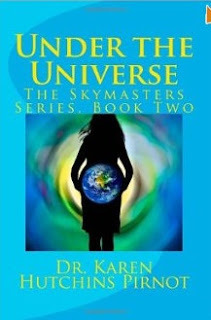 not just about time travel. In both worlds, the girls have a disabled sibling, and author Dr. Karen Hutchins Pirnot handles this with tact and sensitivity. I enjoyed the empathy between the cousins. Allie goes on a learning curve as she discovers the differences between her world and her cousin’s with snippets of geography, history, science, economics and social change, and astronomy filtering through. The author has popped some famous modern and historical names into the mix, with amusing characters that give their own opinion of life. There’s a nice blend of facts, fantasy, and legend (Atlantis and Mu). The story ends with clearly more investigation planned and a hint of danger. My only criticism is there is perhaps too much information for this age group to absorb. 4 stars
not just about time travel. In both worlds, the girls have a disabled sibling, and author Dr. Karen Hutchins Pirnot handles this with tact and sensitivity. I enjoyed the empathy between the cousins. Allie goes on a learning curve as she discovers the differences between her world and her cousin’s with snippets of geography, history, science, economics and social change, and astronomy filtering through. The author has popped some famous modern and historical names into the mix, with amusing characters that give their own opinion of life. There’s a nice blend of facts, fantasy, and legend (Atlantis and Mu). The story ends with clearly more investigation planned and a hint of danger. My only criticism is there is perhaps too much information for this age group to absorb. 4 starsFirst reviewed for Readers Favorite
(Please note that I downloaded this to the Amazon Kindle on my computer and had problems with the formatting. This may have been corrected by now)
by Fiona Ingram



